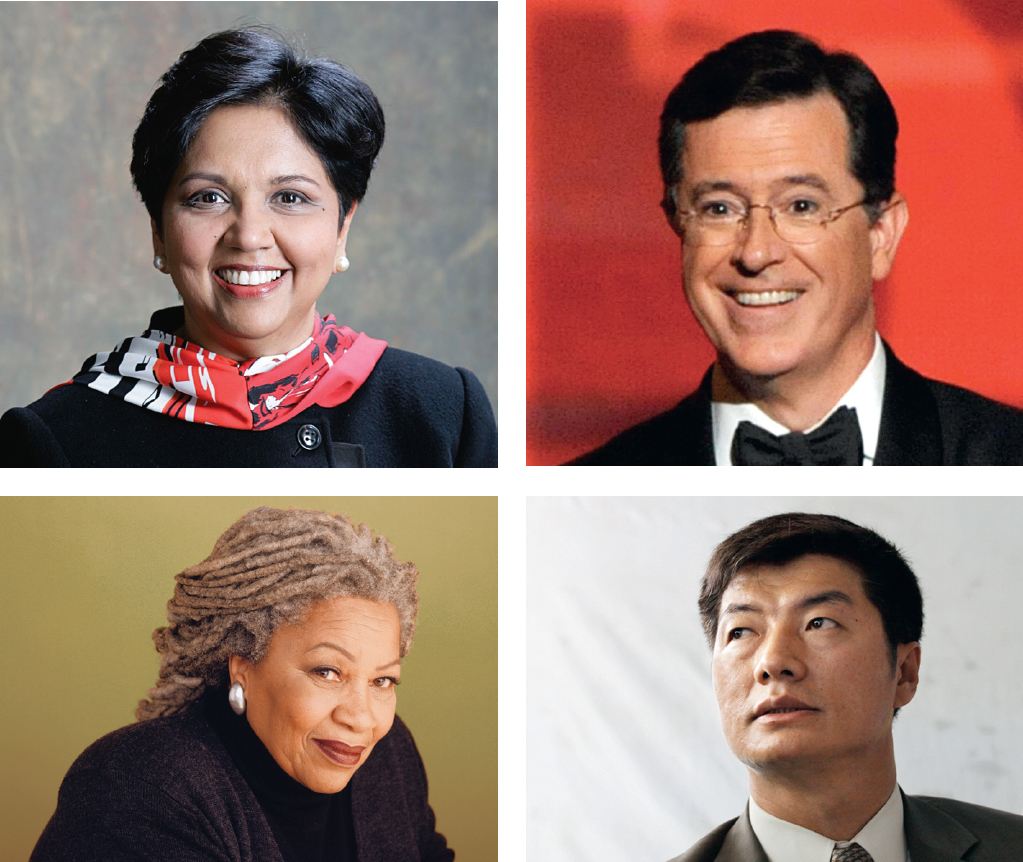Interviewing a Subject

Responding to an Image
Suppose that you had an opportunity to interview one of the people shown here. Business leader Indra Nooyi (top left) is CEO of PepsiCo, the international beverage and food company. Stephen Colbert (top right) entertains as a comedian, satirist, and television host. Harvard Law School graduate Lobsang Sangay (bottom right) is the leader-in-exile of Tibet, elected in 2011 but not recognized by China, which rules Tibet. Author Toni Morrison (bottom left) is the recipient of a Pulitzer Prize, Nobel Prize, and Presidential Medal of Freedom. What questions would you most like to ask the interviewee? Based on the person’s public image and personality as revealed in these photos, what kind of response would you expect to receive? How do you think the photographer has tried to suggest something about the person?
Don’t know what to write about? Go talk with someone. Meet for half an hour with an anthropology professor, and you probably will have plenty of material for a paper. Just as likely, you can get a paper’s worth of information from a ten-minute exchange with a mechanic who relines brakes. Both the mechanic and the professor are experts. But even people who aren’t usually considered experts may provide you with material.
As this chapter suggests, you can direct a conversation by asking questions to elicit what you want to find out. You do so in an interview — a conversation with a purpose — usually to help you understand the other person or to find out what that person knows. You may use what you learn to profile the individual interviewed. However, interviews also provide expert information about a topic, intriguing firsthand accounts of an event or an era, or systematic research samples of selected or representative people.
Why Interviewing a Subject Matters
In a College Course
- You interview people for your American Studies course, talking in person, by telephone, or online. You seek firsthand knowledge about a moment in history that engages you from a veteran, a civil rights activist, a disaster survivor, or a person who experienced a local event.
- You interview a person who mentors students or sponsors internships to gain career advice (perhaps from an early childhood educator, public safety officer, health care provider, artist, catering manager).
In the Workplace
- You interview an “informed source” for a news site, a benefits specialist for a profile in your company newsletter, or your customers or clients for feedback on company products and services.
In Your Community
- You contact experts to learn about composting food waste through the new city program or about installing a ramp to make your home accessible for your child who uses a wheelchair.
 Who would you like to interview as an intriguing personality? Who would you like to interview for answers or advice about some of your questions? In what situations might you conduct interviews in the future?
Who would you like to interview as an intriguing personality? Who would you like to interview for answers or advice about some of your questions? In what situations might you conduct interviews in the future?